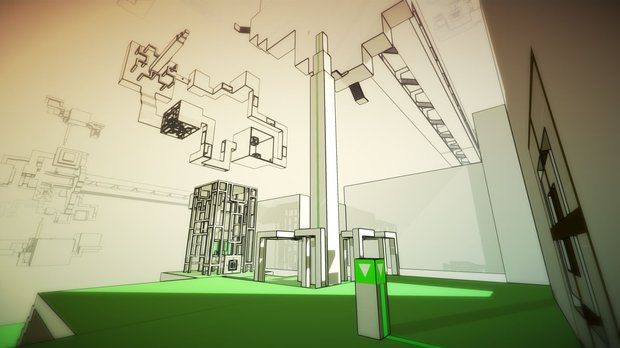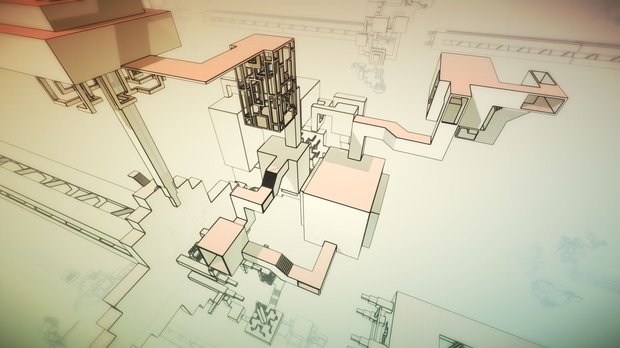Relativity is the mind-bending cousin of Portal and Echochrome
I have two blocks, one purple and one blue. I have to put the purple block against a painted square on the wall five block-lengths from the ground and keep it there. It's a brainteaser, and I feel pretty clever when I figure it out: just stack one block onto top of the other until they reach the square.
That may sound like the kind of answer you'd get from someone unsure why we haven't landed a spaceship on the sun yet, but really, it makes perfect sense! In the same way it makes sense for changing perspectives to alter physical realities in Echochrome, or for two distant points to connect via an unseen path in Portal. Realitivity lets you manipulate planes and gravity to progress through the world, but it exercises that bizarrely-logical part of the brain in thoughtful and engaging ways.

As with Portal and Echochrome, the key to playing Relativity well is getting a firm grasp on how much you can do by changing one element of the world's structure. Here, you have the power to change gravity: walking up to a wall and using the right trigger makes that wall your new floor. Each floor also has its own unique color, and when you're standing on it, you can only pick up and move cubes of that same hue. Visually, it's a bit like an MC Escher painting (the game is named after one of his most famous works) with some Mondrian thrown in for flavor. It's a simple concept that gets much more complex as you go along, as with the block-stacking example I mentioned before: I was able to put the blocks one on top of the other because they were different colors, and the one that didn't correspond to the floor I was standing on would always stay in place, even against my current gravity.
I felt very clever for solving that one, only to find that was one of the tutorial puzzles. Leave the building you start in and the world is all immediately accessible, if a little far away, as every level is represented by an abstract shape floating in the surrounding emptiness. Learning how to get to them is tricky (I was told to jump off the edge of the platform I was standing on, which caused me to loop through space and land on the plane above where I just was), and puzzles get infinitely more headache-inducing as you go. Simple move-the-block brainteasers give way to literally infinite pyramids, and long walkways turn into weaving skyscrapers you have to navigate through a series of impossible rooms.

Perhaps most confusing is why you're completing these puzzles; whether your victories have some greater narrative purpose (as in Portal) or the game is simply an exercise in abstraction (like Echochrome). Speaking with Game Director Willy Chyr, I learned the answer is both: it's mostly about abstraction, but there are hints of a narrative buried inside, which will apparently clear up questions like ‘why do I fall infinitely’ and ‘how do blocks grow on trees’? If that's true, figuring out the 'story' of this place might be the most baffling part of the whole experience, and given how hard the puzzles can be, that's pretty damn baffling. Not for the easily frustrated, Relativity is a theoretically simple game that will confuse you to no end. But if besting those kinds of challenges is your idea of fun, then go ahead and take a step off the edge.
Sign up to the GamesRadar+ Newsletter
Weekly digests, tales from the communities you love, and more
Former Associate Editor at GamesRadar, Ashley is now Lead Writer at Respawn working on Apex Legends. She's a lover of FPS titles, horror games, and stealth games. If you can see her, you're already dead.



